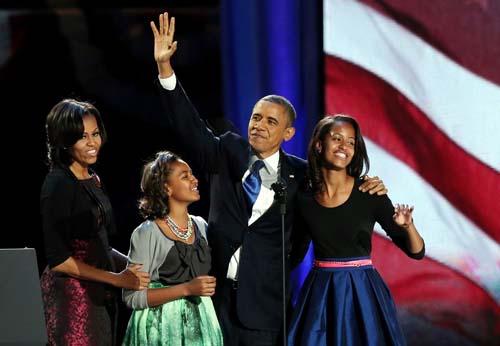|
 |
|
APPRECIATION: U.S. President Barack Obama walks on stage with first lady Michelle Obama and daughters Sasha and Malia to deliver his victory speech on election night at McCormick Place on November 6 (XINHUA/AFP) |
In the early hours of November 7, U.S. President Barack Obama stood in front of a cheering crowd and gave a victory speech promising "the best is yet to come" for America. With his re-election secured and his last campaign behind him, Obama can now fully pursue an agenda of salvaging the American economy and turning attention to U.S. foreign policy. By this time next year, expect some major moves by the administration to push new trade agreements, contain global conflicts and wind down U.S. military action in Afghanistan, say pundits.
Obama faces a list of foreign policy and national security issues that have been put on the back burner during the campaign, reports the New York Times. Topping the list is the ongoing civil war in Syria and escalating tensions over Iran's nuclear ambitions.
"For reasons of history and political reality, a re-elected Obama is likely to devote more time to foreign affairs. From Richard M. Nixon to Bill Clinton, presidents have tended to make their bid for statesman status in their second terms. The prospect of continuing gridlock — with the Republicans still controlling the House — gives Mr. Obama all the more reason to favor diplomacy over domestic legislation," writes Mark Landler.
Obama has been reluctant of becoming involved in Syria, as he ran on a platform of ending wars in the Middle East. Now, however, he may be more committed to intervention as the chaos in Syria could potentially spark a sectarian war that spreads to Lebanon, Bahrain and even Saudi Arabia.
Regarding Iran, 2013 could be a decisive year for a "focused and assertive" policy, Martin Indyk, vice president of foreign policy studies at the Brookings Institution told the Christian Science Monitor.
"It's going to be very high on the agenda," Indyk said. "Preventing Iran from getting nuclear weapons is a critical imperative for bolstering the nonproliferation regime."
New faces
Secretary of State Hillary Clinton has repeatedly said she will step down from her post at the beginning of Obama's second term. The new face of U.S. foreign policy has yet to be named, with John Kerry reportedly aiming for the post. Also on the short list are U.N. Ambassador Susan Rice and National Security Advisor Tom Donilon, predicts Foreign Policy's Josh Rogin.
Kerry has been chair of the Senate Foreign Relations Committee since 2009, and has played a leading role in the U.S. response to the Arab Spring revolutions, especially in Syria. Rice is also a heavy favorite for the role, with close personal ties to Obama and experience on a wide array of foreign policy matters including gaining Russian and Chinese support for a U.N. resolution on Syria. She has faced recent criticism for the administration's handling of the Benghazi, Libya, attacks and may face a difficult confirmation hearing.
"Star power is important in this position. It's very difficult to follow someone as well liked and capable as Hillary Clinton with the kind of presence she has globally," H. Andrew Schwartz, a senior vice president at the Center for Strategic and International Studies in Washington, told Reuters.
"It is part of Obama's effort to repair the U.S. image abroad, and he feels that stars can get that done."
| 